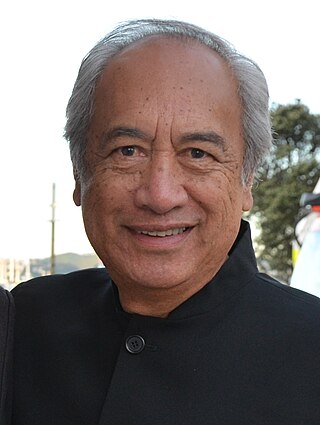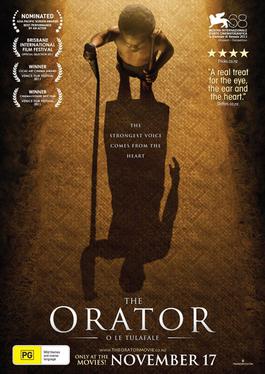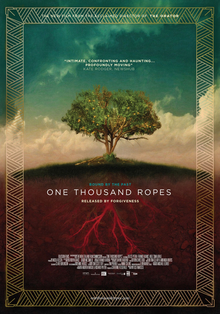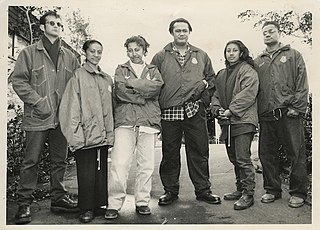Related Research Articles

Samoa, officially the Independent State of Samoa and until 1997 known as Western Samoa, is a Polynesian island country consisting of two main islands ; two smaller, inhabited islands ; and several smaller, uninhabited islands, including the Aleipata Islands. Samoa is located 64 km (40 mi) west of American Samoa, 889 km (552 mi) northeast of Tonga, 1,152 km (716 mi) northeast of Fiji, 483 km (300 mi) east of Wallis and Futuna, 1,151 km (715 mi) southeast of Tuvalu, 519 km (322 mi) south of Tokelau, 4,190 km (2,600 mi) southwest of Hawaii, and 610 km (380 mi) northwest of Niue. The capital and largest city is Apia. The Lapita people discovered and settled the Samoan Islands around 3,500 years ago. They developed a Samoan language and Samoan cultural identity.

Witi Tame Ihimaera-Smiler is a New Zealand author. Raised in the small town of Waituhi, he decided to become a writer as a teenager after being convinced that Māori people were ignored or mischaracterised in literature. He was the first Māori writer to publish a collection of short stories, with Pounamu, Pounamu (1972), and the first to publish a novel, with Tangi (1973). After his early works he took a ten-year break from writing, during which he focused on editing an anthology of Māori writing in English.

Tui Ātua Tupua Tamasese Tupuola Tufuga Efi is a Samoan political leader and as holder of the maximal lineage Tama-a-'āiga title of Tupua Tamasese, is one of the four paramount chiefs of Samoa. He also holds the royal pāpā title of Tui Atua.

Albert Tuaopepe Wendt is a Samoan poet and writer who lives in New Zealand. He is one of the most influential writers in Oceania. His notable works include Sons for the Return Home, published in 1973, and Leaves of the Banyan Tree, published in 1979. As an academic he has taught at universities in Samoa, Fiji, Hawaii and New Zealand, and from 1988 to 2008 was the professor of New Zealand literature at the University of Auckland.
Samoan literature can be divided into oral and written literatures, in the Samoan language and in English or English translation, and is from the Samoa Islands of independent Samoa and American Samoa, and Samoan writers in diaspora. Samoan as a written language emerged after 1830 when Tahitian and English missionaries from the London Missionary Society, working with Samoan chiefly orators, developed a Latin script based Samoan written language. Before this, there were logologo and tatau but no phonetic written form.
Sima Urale is a New Zealand filmmaker. Her films explore social and political issues and have been screened worldwide. She is one of the few Polynesian film directors in the world with more than 15 years in the industry. Her accolades include the Silver Lion for Best Short Film at the Venice Film Festival for O Tamaiti (1996).
Makerita Urale is a documentary director and playwright, and a leading figure in contemporary Polynesian theatre in New Zealand. She has produced landmark productions in the performing arts. She is the writer of the play Frangipani Perfume, the first Pacific play written by a woman for an all-female cast. Working in different art mediums, Urale also works in film and television. She is the director of the political documentary Children of the Revolution that won the Qantas Award (2008) for Best Māori Programme.

Briar Grace-Smith is a screenwriter, director, actor, and short story writer from New Zealand. She has worked as an actor and writer with the Maori theatre cooperative Te Ohu Whakaari and Maori theatre company He Ara Hou. Early plays Don't Call Me Bro and Flat Out Brown, were first performed at the Taki Rua Theatre in Wellington in 1996. Waitapu, a play written by Grace-Smith, was devised by He Ara Hou and performed by the group on the Native Earth Performing Arts tour in Canada in 1996.

The Orator is a 2011 Samoan and New Zealand film written and directed by Tusi Tamasese. It is the first ever Samoan feature film, "entirely shot in Samoa, in the Samoan language, with a Samoan cast and story". The film was selected as the New Zealand entry for the Best Foreign Language Film at the 84th Academy Awards, but it did not make the final shortlist. It is the first time New Zealand has submitted a film in this category.
Samoa's first ever feature film, The Orator, was released in 2011. Shot and set in Samoa, in the Samoan language, it features a Samoan cast. It was produced with financial support from the Samoan government, in the hopes of showcasing Samoan culture to an international audience, and of promoting Samoa as a tourist destination.

The 68th annual Venice International Film Festival was held in Venice, Italy between 31 August and 10 September 2011. American film director Darren Aronofsky was announced as the Head of the Jury. American actor and film director Al Pacino was presented with the Glory to the Film-maker award on 4 September, prior to the premiere of his upcoming film Wilde Salomé. Marco Bellocchio was awarded with the Golden Lion for Lifetime Achievement in September. The festival opened with the American film The Ides of March, directed by George Clooney, and closed with Damsels in Distress by Whit Stillman.
Fa'afiaula Sagote was a Samoan actor.
The 2012 Sorta Unofficial New Zealand Film Awards was the first presentation for the Sorta Unofficial NZ Film Awards, a New Zealand film industry award.
Louis Sutherland is a New Zealand film, television and advertising director and actor. He is of Samoan and Scottish descent, and based in Wellington.
Leon Gordon Alexander Narbey is a New Zealand cinematographer.

One Thousand Ropes is a 2017 New Zealand drama film directed by Tusi Tamasese. It was screened in the Panorama section at the 67th Berlin International Film Festival. It was selected as the New Zealand entry for the Best Foreign Language Film at the 90th Academy Awards, but was not nominated.

Nina Nawalowalo is a New Zealand theatre director and co-founder of the contemporary Pacific theatre company The Conch. She is known for directing the stage plays Vula and The White Guitar. The first film she directed A Boy Called Piano - The Story of Fa'amoana John Luafutu (2021) won 2022 Montreal Independent Film Festival Best Feature Documentary.

Pacific Underground is a New Zealand performing arts collective, founded in 1993 in Christchurch, New Zealand, to produce contemporary performing art that reflects the group's Pacific Island heritage. In 2016 they received a Lifetime Achievement Award at the Pacific Music Awards. They are the longest running Pacific contemporary performing arts organisation in New Zealand.
Dianna Fuemana is a New Zealand writer, director and performer. She writes for theatre and screen. Her solo play Mapaki was the first that brought a New Zealand-born Niue perspective to the professional stage. In 2008 Fuemana won the Pacific Innovation and Excellence Award, at the Creative New Zealand Pasifika Arts Award. Fuemana was one of nine women writer-directors of the 2019 feature film Vai.
Tupe Lualua is a New Zealand-Samoan choreographer, director, founder of the dance company Le Moana. She is also the current artistic director and producer for the Measina Festival, and award winning choreographer Tupua Tigafua. In 2019 Lualua was the Creative New Zealand Samoa Artist in Residence.
References
- 1 2 3 4 5 Barlow, Helen (8 September 2011). "Tusi Tamasese: A voice from Samoa". The New Zealand Herald . Retrieved 25 November 2011.
- 1 2 "The Orator", ABC 4, 20 January 2012
- ↑ Cook, Megan; Wilton, Caren (22 October 2014). "Page 4. Writers | Story: Arts education and training". Te Ara: The Encyclopedia of New Zealand. Retrieved 22 August 2022.
- 1 2 "Tusi Tamasese | Arts Foundation New Generation". Arts Foundation. Retrieved 25 August 2020.
- ↑ "The Orator: Sounds of silence". The New Zealand Herald . 1 October 2011. Retrieved 25 November 2011.